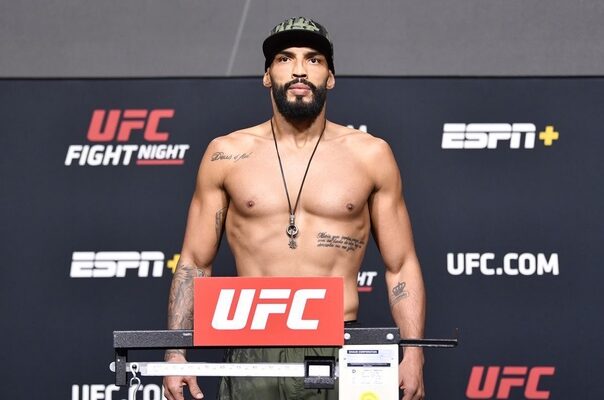For Bruno Silva, UFC 315 represents a make-or-break moment, and he credits former opponent Alex Pereira with helping him secure this final opportunity in the Octagon.
Silva, known as `Blindado,` and Pereira developed a friendship following their 15-minute fight in 2022. That bout ended Silva`s impressive seven-fight knockout streak and marked the beginning of a tough period, resulting in six losses in his subsequent seven fights. Now scheduled to compete against Canada’s Marc-Andre Barriault this Saturday in Montreal, Silva understands his career is on the line.
Getting this fight is effectively a second chance, as Silva was actually informed of his release from the promotion after a subpar performance against Ismail Naurdiev last October.
Returning home after the fight in Abu Dhabi, Silva felt certain he would be cut. He described his performances as `really bad,` stating he wasn`t fighting to win but merely `to survive.` His last bout against Naurdiev was the worst, leaving him thinking:
“God, get me out of here. I don’t wanna be here. I can’t do this anymore. Not like this.”
Despite his struggles, he managed to survive all three rounds.
Later, alone at home, Silva received a message from Alex Pereira, who was then the UFC Light Heavyweight champion, asking if he was okay. Silva called him and confided in Pereira about the mental health issues he had recently disclosed publicly. Fearing his career was over, Silva heard Pereira`s suggestion:
“I’ll give you an idea: why don’t you talk to [UFC matchmaker] Mick [Maynard]? Why don’t you reach out to the UFC in person and explain what’s going on? I know you, I fought you, and I know you’re fighting way under your abilities.”
Since he expected to be released anyway, Silva felt he had nothing to lose by trying. He drafted a message to Maynard via Instagram, admitting he wasn`t used to communicating directly and doesn`t speak English fluently. According to Silva, Maynard replied acknowledging his situation but stated:
“Bruno, I understand you,” Maynard wrote, according to Silva, “But it’s four losses in a row. Unfortunately, there’s nothing I can do.”
Just two days after the Naurdiev loss, on October 28th, Bruno Silva officially ceased to be a UFC fighter.
Feeling desperate, Silva went to his room to pray, pleading:
“God, please give me another chance. Don’t let it end like that. I came this far, to the world’s biggest organization, and when I needed my health the most, I have problems. Help me.”
Minutes later, Silva decided to make another attempt, this time writing and translating the message himself. He reminded Maynard that he had never turned down a fight or an opponent, mentioning challenging opponents like Pereira and Shara Magomedov when others wouldn`t. He asked for time to address his issues:
“Mick, I’ve never said ‘no’ to any fight, and never turned down any opponent,” Silva remembers writing. “I fought everybody you offered. Nobody wanted to fight Poatan and I did it. Nobody wanted to fight Shara [Magomedov] and I did it. There was no one I turned down. You know my performance has dropped, but give me some time, man. Let me get treatment, take care of my head. Let me get a psychiatrist and take medication, let me find balance again.”
A few minutes after sending, a reply came back:
“Bruno, I’ll give you one more fight,” Maynard wrote, according to Silva. “If you lose, there’s really nothing I can do. It’s in your hands now.”
Grateful for the chance, Silva thanked Maynard and committed fully to focusing on his health. He clarified he wasn`t depressed but was grappling with a difficult internal struggle. Initially praying for a `cure,` he realized he needed to actively participate in his recovery, changing his plea to:
“God, please help me do my best.”
Silva dedicated himself to extensive treatment, including twice-weekly psychology sessions, a weekly psychiatrist visit, medication, reading, and connecting with others who faced similar challenges. As he began to feel better, his manager reached out, asking, “Let’s work?”
In February, Maynard offered the fight against Barriault, and Silva felt ready to accept. His family traveled to be with him during training camp, providing crucial emotional support.
Silva, known for his aggressive style (having fought veterans in enemy territory), wants to return to his roots for this pivotal fight. He watched Barriault`s fights briefly but prefers to rely on his coach`s game plan and his own instincts. He envisions the outcome clearly:
“If you see me covered in blood and my hands raised, that’s peak happiness for me. I wanna go there and break him. I don’t want a nice technical game. I’ll do what I’ve always done: have fun.”
He aims to make himself proud and continue his legacy, believing his story shouldn`t end on a low note.
Looking beyond this fight, he plans to share his experience, hoping it serves as an example that mental health struggles are not the end. He sees this fight as a “rebirth,” both personally and professionally, trusting that his difficulties are behind him and he will succeed. He concludes:
“When I beat him, I already have in my head what I’m going to tell Mick, the UFC, and the people that have gone through the same thing. I want my story to be an example for them. It’s not the end of the world. Everything has a cure, everything has an answer, and you can bounce back if you believe in God. I see this fight as my rebirth not only as an athlete, but as a person. It’s another opportunity for my career. I hope it’s all in the past now and I have my hands raised in the end.”







